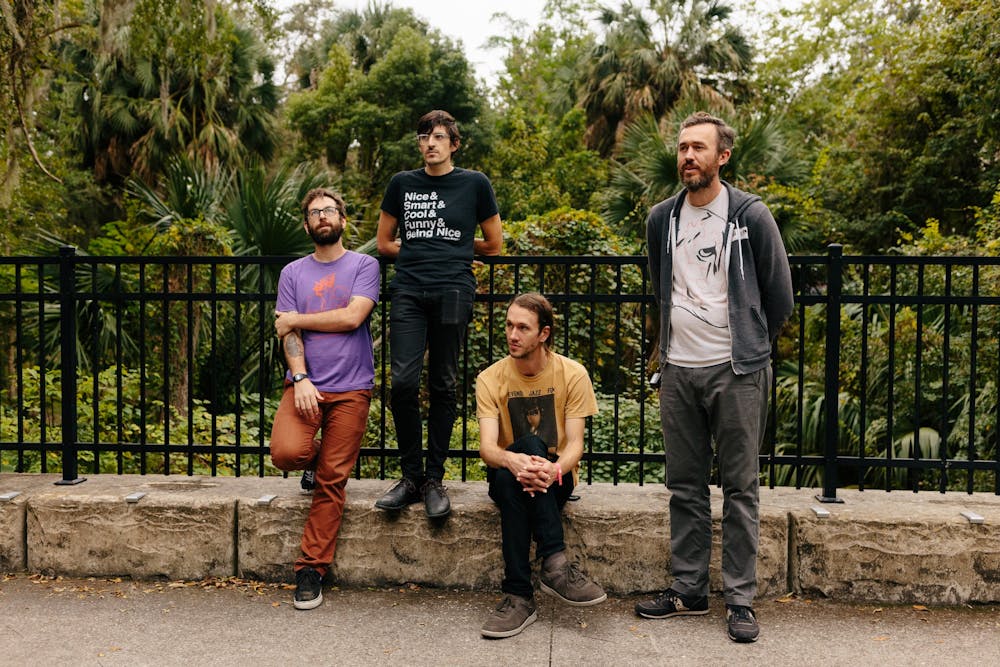It’s impossible to have a neutral opinion of AJJ. Sean Bonnette’s warbled lyrical delivery of topics from self–loathing and mutilation to the coming apocalypse, paired with the furious acoustic strumming of hardcore on a budget, are either beloved or loathed by all who stumble across the Phoenix–based folk punk band. The band’s newest record, Good Luck Everybody, won’t do much to sway the skeptics, but it will be rightfully adored by longtime fans.
Good Luck Everybody is AJJ’s first self–produced album, released on AJJ unlimited LTD after leaving longtime labels Asian Man Records and SideOneDummy while also pulling their music from the Plan-It-X Records catalog when label owner Chris Clavin was accused of sexual misconduct. Bonnette took his usual self–deprecating approach when choosing to self–produce the new record: “One thing that makes me rather giddy is that without a label or producer, our listeners will have no one to blame besides us for the way our sound has changed,” he told Tone Deaf in October.
Bonnette also summarized the album in one sentence as such: “Sonically, it’s our least punk record, and lyrically, it’s our most punk record.” Such a description tracks with AJJ’s progression as a band: early records, like 2005’s Candy Cigarettes and Cap Guns and 2007’s People Who Can Eat People Are the Luckiest People in the World, relied on Bonnette and bassist Ben Gallaty’s frantic shouting and strumming, while 2016’s The Bible 2 deviated from the folk punk script on tracks like the electric cello–centered “Small Red Boy.”
Good Luck Everybody focuses on Preston Bryant’s keyboard work much more than Bonnette’s acoustics.“No Justice, No Peace, No Hope” is the most stripped–down, featuring only piano and vocals, and “Psychic Warfare” once again features orchestral strings. But even the guitar–heavy tracks like “Normalization Blues” feel softer and more tempered, reflecting either the maturity of a band that released its first record fifteen years ago or the old age of a guitarist whose hand hurts from playing nothing other than sixteenth notes.
The two themes of punk, especially folk punk, can be reduced to simple phrases: “I hate myself” and “I hate the world.” Traditionally, AJJ has skewed towards the former, combining emotional turmoil with body horror on older songs like “White Worms,” “Hate Song for Brains,” and “Big Bird." The theme continues in earnest on “Body Terror Song,” telling the listener, “I’m very sorry that you have to have a body / One that will hurt you and be the subject of so much of your fear.”
AJJ is no stranger to political songs, from the tongue–in–cheek “American Tune” from 2011’s Knife Man to the scathing “Joe Arpaio is a Punk.” Good Luck Everybody, however, is easily the band’s most political record. “Normalization Blues” describes the American desensitization to a terrible world; “No Justice, No Peace, No Hope” serves as a bleak condemnation of the future; “Mega Guillotine 2020” references a theoretical guillotine that “can fit up to fifteen congressmen at the same time;” and “Psychic Warfare” is the latest punk song to soundtrack the Trump administration.
The political shift of this record comes with a subtle implication from a band that made its bones on self–deprecation, going so far to describe their own genre as “garbage pop.” For such a large percentage of the record, which clocks in at a lean 27 minutes, to focus on issues that exist outside of Bonnette’s own head, the message arises: the current political landscape is so awful that I finally hate something more than I hate myself.
Most folk punk, especially the kind peddled by AJJ, relies on disguising bleak lyrics with Bonnette’s voice, which seems incapable of complete misery. Even by the band’s standards, Good Luck Everybody is pessimistic and grim. Bonnette did, however, offer a solution when introducing the record on Bandcamp: “Basic human connection is the path to our collective return to sanity.”
The concluding track on an AJJ album is either its most pessimistic or optimistic. “When I’m a Dead Boy” and “Big Bird” reflect Bonnette’s interpretation of his own worthlessness, for instance, while “People” says that, no matter what atrocities humankind may commit, they still have something to offer. The final track on Good Luck Everybody, “A Big Day for Grimley,” is the most uplifting. With his soft strumming, subdued voice, and whistling on the bridge, Bonnette channels straightforward folk as he promises “Solitude for the stoic / Mirth for the merry / A quiet room for the overwhelmed / Arcades for the ADHD.”
The album title is referenced on two tracks, first cynically at the end of “Normalization Blues,” and then genuinely on “A Big Day for Grimley.” Over the course of the album, it seems, Bonnette and the rest of AJJ have gone from denouncing the current state of affairs to finding some small glimmer of hope for a better world. It’s an important conclusion to reach, especially for a band by sad people, for sad people. All is not lost.
When they opened for PUP last fall, half the audience was screaming every word, while the other half periodically checked their watch to see when the strange, tall men would abdicate the stage. Yet, love them or hate them, AJJ is an important band for the modern punk scene, and Good Luck Everybody is an important record. The tumultuous sociopolitical landscape of 2020 provides ample opportunity for punk to get back to its pissed–off roots, but anger is only productive when paired with hope.
Good Luck Everybody is out now.

